September 2017 Social and SEO Update

Welcome to the social and SEO update for the month!
Keyword Rankings in August
Overall, we had a very positive month for customers’ keyword rankings!
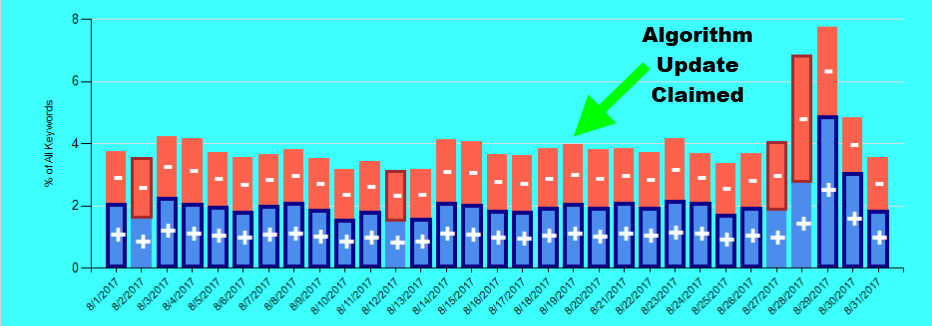
To give you an example of our success, we had 27 of 31 days where we saw more positive ranking movement than negative ranking movement. During the month of August, there was one unconfirmed Google Algorithm update around the 19th. Speculation is that the update impacted sites with low-value content and lots of ads, bad user experience, or general lack of relevance to a query. Within our customer data, we didn’t see much fluctuation outside of what we expect to see normally. This could speak to the impact being more national vs. local.

Toward the end of the month, we did see one major fluctuation within our customer data. In general, we saw a lot of customers temporarily lose first-page rankings with massive (80+ rank) drops. We were not able to identify any basic customer or keyword similarities. The next day, we saw an almost complete reversal in keyword drops. Something interesting that occurred after the mass shifting is more customers moving from the second page to the first. This trend has continued into September, which could mean an update for local searches.
Google Algorithm Updates
This is probably a good time to share how we review and handle Google Algorithm updates.
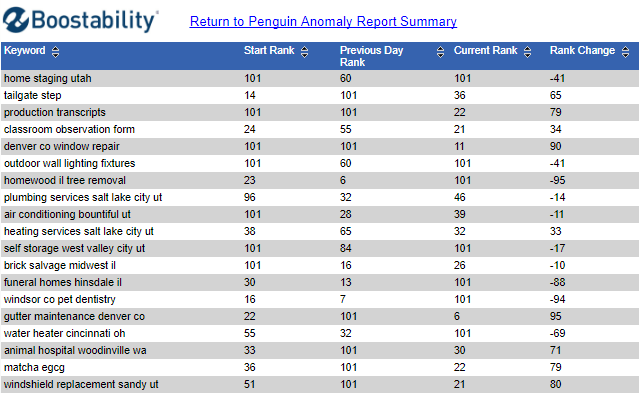
First, when we see, hear, or read that an update has been released, we review our internal ranking to see if we had any impact (anomalistic ranking changes). If we see a group of keywords that appear to have been affected by the ranking anomaly, we will do a deeper dive into the rankings and keyword history. We look for trends and similarities in the rankings, customers, and SERPs (Search Engine Result Placements). This review helps us understand if we can identify the true reason that a keyword was affected. Once we understand “why” a keyword is affected, we can then help correct any issues or needs.
Updates vs. Tests
When we think about Google updates, most people think of some of the most prominent (named) updates like Panda, Penguin, Hummingbird, and more. However, more and more, events that appear to be algorithm updates are actually just algorithm tests. These tests are like small experiments meant to measure the effects of certain algorithm changes on the web. Even though they’re disguised as updates, these tests are actually becoming easier to spot. Often they contain short-term changes that only affect a few queries compared to major algorithm updates.
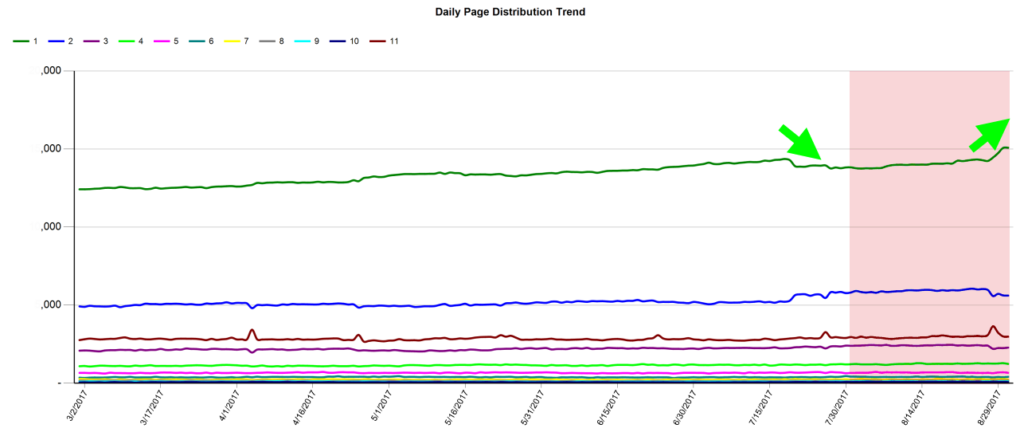
While these tests are not new, they are often pinged as core updates from industry news sources. The frank reality is that without a massive and controlled set of data, calling these updates out exactly is a guess at best. I truly feel the days of massive penalties or shifts in the search landscape are gone. Instead, we will most likely see very small and incremental changes to the core search algorithm that eventually reverse or evolve over time. I would also speculate that we most likely won’t receive any clear or definitive information from Google themselves, as this could impact their test results.
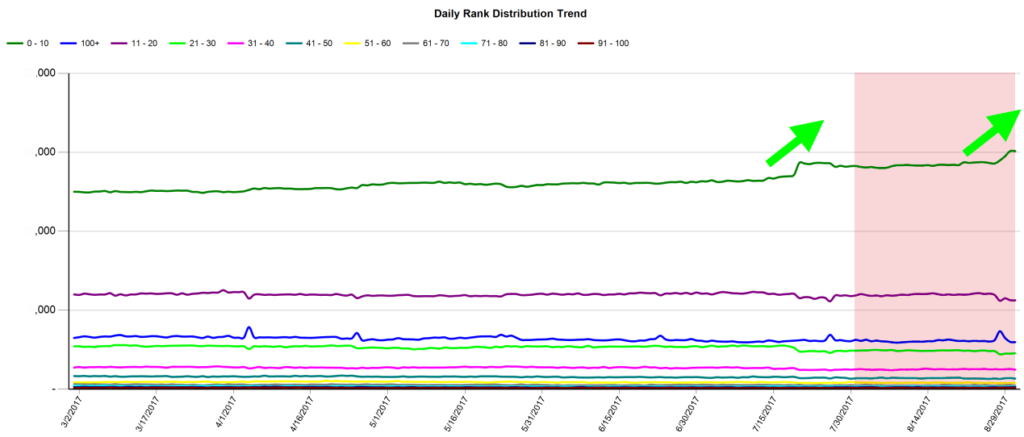
Surviving in a New Era of Google Updates
This may sound like a hopeless scenario for any customer trying to achieve better rankings, but there are two key things anyone performing SEO can adapt to survive and thrive through any updates or tests.
To start, patience is a must. Because we don’t have perfect data or insight into exactly what is happening, there will be a lot of guessing. This means we won’t know for sure what is causing an impact or if the impact will be consistent. It is best to wait, gather more data, and see if trends begin to emerge.

The second recommendation would be consistency in running your business and website. This applies to every facet of a website. From the service, content, social posting, and link building, everything should be consistent. This regularity helps prove the trust worthiness of a website. With patience and consistency, any website can endure and grow through any algorithm updates.
SEO Trade Tip! Targeting the proper URL.
As a bonus, I wanted to note a unique scenario I have seen a few times when deep diving ranking issues for clients.
The scenario I have encountered is where we have a change in the URL Google sees as the most relevant and this, in turn, is causing ranking fluctuations. Below is an example from one of our Austrian customers. When Google recognizes the relevant URL as our target URL, they rank within the first page or two. However, if Google recognizes another page on their site, they drop 10+ pages.
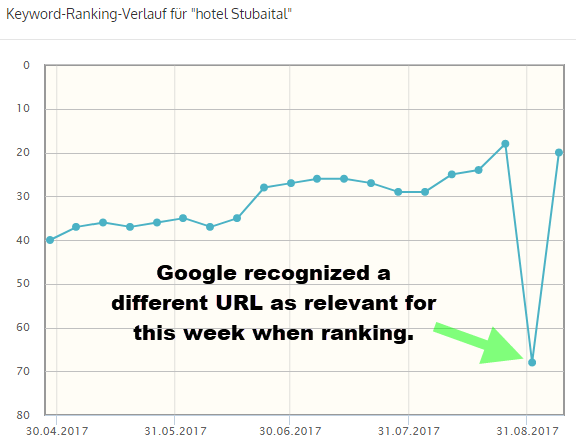
If you see this scenario, either interlink or remove any relevant content from the non-target page. This can often times solve this bouncing issue and help retain steady rankings.
Key Articles
SEO Updates
- Updated Search Quality Guidelines – Jennifer Slegg dives into the latest version of Google Quality Rater Guidelines and details exactly what has changed. (Source)
- Disavowing a Site – Disavowing a site Google Search Console it does not negatively affect that site, and Google does not see it as negative, confirmed by Google’s Gary Illyes. (Source)
- Google Removing 3-Packs – An article by Joy Hawkins explaining how some queries saw a test with ads that directly replaced the organic 3-pack listings. (Source)
- Top Technical SEO Mistakes – SEMRush takes an in depth look at their data base and determines the top 40 technical mistakes made in SEO. (Source)
- Google Crawls Home Page First – Google’s John Mueller confirmed that Google tries to always crawl the home page of a website first. (Source)
- SEO Resource List – This is a great article from Search Engine Watch that goes over the best experts and companies to read about SEO and updates. (Source)
Social
- Creating Testimonial Videos – Great article detailing how to create unique and interesting testimonial videos for social media. This is especially interesting since most of our clients are serviced based. (Source)
- Facebook Limits Posts Into Ads – Facebook is planning to limit the type of page posts that can be converted into ads. (Source)
- Measuring Social Success WITHOUT Conversions – A great article going over a few metrics that can signify great social success without direct access or awareness of conversions. (Source)
- Most Popular Apps – A study was conducted by ComScore around what the most popular apps in the US are. (Source)
